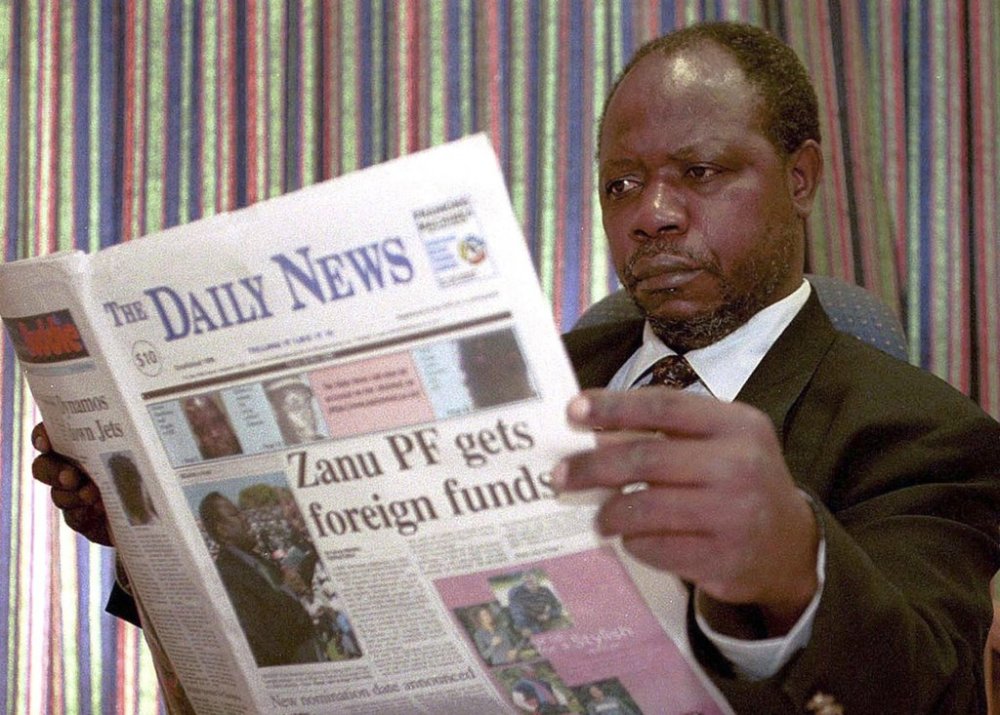Zimbabwe mourns veteran journalist and critic who challenged state media hegemony
Advertisement
Read this article for free:
or
Already have an account? Log in here »
To continue reading, please subscribe:
Monthly Digital Subscription
$0 for the first 4 weeks*
- Enjoy unlimited reading on winnipegfreepress.com
- Read the E-Edition, our digital replica newspaper
- Access News Break, our award-winning app
- Play interactive puzzles
*No charge for 4 weeks then price increases to the regular rate of $19.00 plus GST every four weeks. Offer available to new and qualified returning subscribers only. Cancel any time.
Monthly Digital Subscription
$4.75/week*
- Enjoy unlimited reading on winnipegfreepress.com
- Read the E-Edition, our digital replica newspaper
- Access News Break, our award-winning app
- Play interactive puzzles
*Billed as $19 plus GST every four weeks. Cancel any time.
To continue reading, please subscribe:
Add Free Press access to your Brandon Sun subscription for only an additional
$1 for the first 4 weeks*
*Your next subscription payment will increase by $1.00 and you will be charged $16.99 plus GST for four weeks. After four weeks, your payment will increase to $23.99 plus GST every four weeks.
Read unlimited articles for free today:
or
Already have an account? Log in here »
Hey there, time traveller!
This article was published 26/03/2025 (220 days ago), so information in it may no longer be current.
HARARE, Zimbabwe (AP) — Zimbabwe is mourning Geoffrey Nyarota, one of the country’s most prominent journalists best known for exposing government corruption and launching what became the country’s most popular and critical independent newspaper.
Nyarota died on Saturday of colon cancer. He was 74. His burial is set for Wednesday.
The veteran newsman came to prominence in the late 1980s when, as editor of state-run newspaper The Chronicle, he exposed a racket involving cabinet ministers and top government officials who jumped the line to buy cars from a local vehicle assembly firm, and resold them for a profit at a time the country was facing vehicles shortages.

A commission of inquiry was established, five ministers resigned, one of them eventually taking his own life, but Nyarota lost his job and left the country to teach journalism in southern Africa.
Nyarota had trained as a teacher, one of the few jobs open to educated Blacks during white minority rule in what was then known as Rhodesia, before branching into journalism.
Government spokesman Nick Mangwana said Nyarota had “left an indelible mark on the country’s journalism landscape.”
“Nyarota slept, dreamt, breathed and lived journalism,” said the Media Institute of Southern Africa, a regional media freedom group.
In 1999, Nyarota helped launch The Daily News, an independent newspaper that challenged the state hegemony on the media. With its motto ” Telling it like it is,” and Nyarota as editor-in-chief, the newspaper gave space to dissenting voices while poking at government corruption and excesses. Soon, the paper was outselling the government-controlled Herald daily newspaper.
Nyarota and journalists from the Daily News were arrested multiple times, the paper’s printing press was bombed in 2001, before it was closed over licensing issues in 2003. Nyarota had resigned from the paper earlier in 2002 due to differences with its new management.
In 2003, he moved to the U.S as a fellow of the Nieman Foundation for Journalism at Harvard University, and also ran an online publication, The Zimbabwe Times. He later returned to Zimbabwe and chaired a government-supported panel of inquiry into media ethics in 2014.
Nyarota was a recipient of several international awards, including the Committee to Protect Journalists’ International Press Freedom Award in 2001, Golden Pen of Freedom Award from the World Association of Newspapers in 2002, and the Guillermo Cano World Press Freedom Prize the same year.
He described his journalism work in the face of adversity as a kind of national responsibility.
“It’s a form of national service for the welfare of our people,” he told The Harvard Gazette after his enrolment at the institution.

